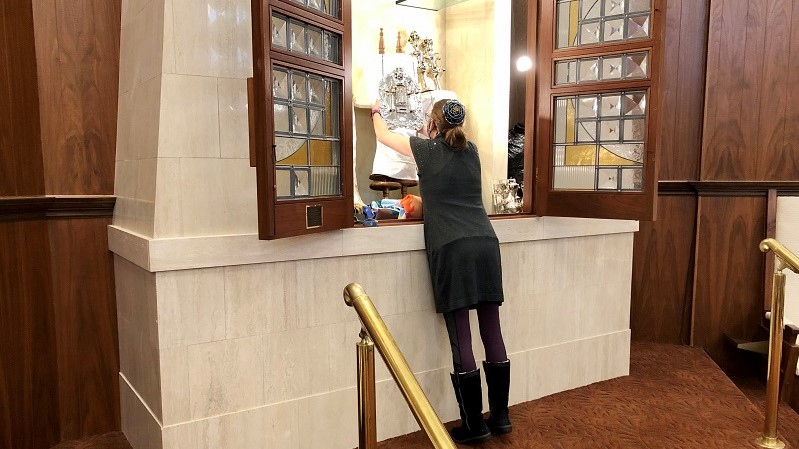I’m not tall. I’m five feet, two inches on a good day. However, the ark in the sanctuary at Neveh Shalom was clearly designed for someone much taller, closer to six feet. In order to get the Torah in and out of it, I must stand on my tiptoes, reach in, and pray that my upper body strength is enough to lift it out. Sometimes, this little stretch just doesn’t cut it, and I have to ask for help.

Occasionally I have this struggle with mezuzot as well. The standard height for a mezuzah is in the top third of the door frame. This means that shorter members of our communities are often left out, since this height can even put the mezuzah out of eye level, let alone out of touching or kissing range.
It can be frustrating when it appears that a mitzvah or ritual item is physically out of reach. As an advocate for our communal spaces being accessible to everyone, I have been on a long-term mission to put our mezuzot at the middle of the door frame, a height which doesn’t require taller congregants to bend down, and also allows our youngest and smallest members to reach up and participate in the mitzvah.
Having our rituals at a reachable height actually allows for better connections with God, as we learn about in this week’s Torah portion. We read from Parshat Chayei Sarah, which makes the transition from one generation to the next. Beginning with Sarah’s death, we learn about Isaac and his courtship with Rebekah, the list of Abraham’s descendants, and the death of Abraham and his burial at the cave of Machpelah. Through it all the family continues to push their way from experiences of loss and grief into the next chapter of life.
As Abraham moves on in his grief, he sets out to help his son Isaac find a wife. He employs his servant to go out and find the right woman for Isaac. As he tasks him with this work, Abraham asks his servant to swear an oath. “Put your hand under my thigh, and I will make you swear by the Lord, the God of heaven and the God of the earth.” For the Torah at this particular moment, this is an oddly specific description of God’s location that Abraham is sharing. The midrash in Sifrei Deuteronomy suggests that before the time of Abraham, God ruled in heaven, but was unknown on earth. It was Abraham who brought God’s sovereignty down to earth.
There is of course a larger lesson here. In this case, Abraham is suggesting that any loving partnership should not be out of reach or devoid of the divine. Instead, all of our rituals, even those of love and marriage, should be within reach of everyone. And with our regular rituals and mitzvot within physical reach, we can focus more on stretching our minds rather than our bodies.



